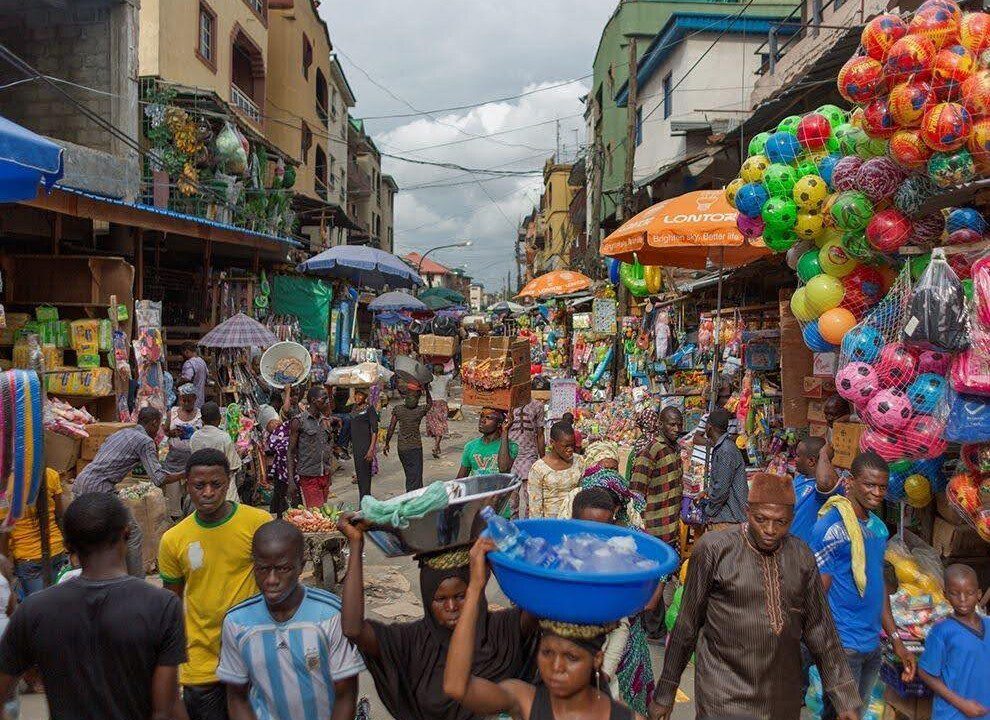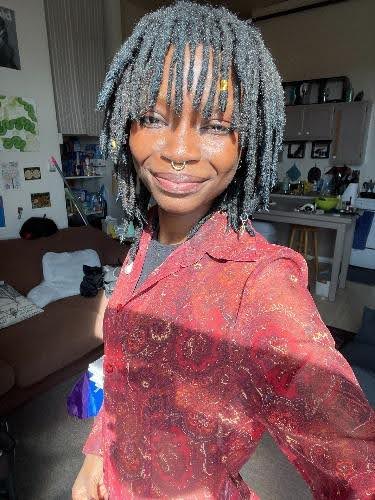Culture May 31, 2024


It was a hot day in Lagos, Nigeria with temperatures hitting 120 degrees, sweating men in front of a mid-sized orange gate revving their bikes, breathing down people’s necks.
Toyin, a girl in her mid-twenties, her shoulder length hair caresses her burning yet glowing brown skin. She fixes her yellow top, opening two buttons to use whatever little boobs she had to encourage the butchers of Alagarin marketplace to lower their prices.
“Where you dey go I go take you,” a bike man said as he swiped the droplets of liquid on his forehead, some of it hitting Toyin. His black and red shades matching his sweat-through shirt and revving bike.
“Abeg commot for road, I just dey get here,” Toyin yelled as she wiped the droplet of sweat that had landed on her arm.
She’d have to shower later before she meets Olabola — the man twice her age, her parents are encouraging her to meet.
Her mother had uttered, “Toyin, he go take you to America, so you better behave yourself,” while thudding her giant mortar on crushed yams.
Yelling and chatter of the bike men brought Toyin back to the market. She looked beyond the orange gates – different patterns of Nigerian tribal attire on sellers and buyers swarmed through her eyes. Some of the sellers were pacing with goods on their heads, some had little market stalls with wooden tables and giant umbrellas giving shade. They sold anything you could imagine. All yelling their respective calls to buyers, encouraging them to buy their goods.
Toyin took a deep breath, inhaling the musty smell of the bike men, the aroma of gasoline sloshing in their motorcycles, and the unique smell of Nigeria’s hot air mixed with all the carbon monoxide that towers over the country.
“You better get the best things for Olabola unless the slap I go give you, you go tell your future grandchildren,” Toyin’s mother’s words rang in her ear as she opened the orange gate ready for an adventure.
Toyin peered her head over the people standing in front of her, people of different colors—something she wasn’t used to. Her eyes barely seeing the baggage claim with suitcases going round and round, Toyin looked out for the bright orange suitcase Olabola had given her.
After ten hours stuck in air, watching brown, fogged-up Nigerian sky turned blue and clear. She was finally in New York City, America.
“We Belong Together” by Mariah Carey rings out as Toyin finally spots her suitcase. Looking through the crowd of people scurrying around, men in their suits and ties, women in their versions with pencil skirts – her in Nigerian tribal wear – she wondered what she was doing in this foreign place.
“That place no be like Nigeria; it be like heaven. Gold on the floor, money falling from the sky. Don’t forget about us ooooo” her father had told her, as she lay on the floor next to his bed, unable to sleep, unable to stop asking questions.
There was no gold on the floor, no money falling from the sky and no Olabola to pick her up from the first American soil she had landed on.
“Here is an orange. I’m sorry I was late.” Olabola said as Toyin dragged her suitcase up the stairs.
“You was like four hours late but it’s okay. I forgive you my husband” Toyin said, panting as she took the orange that was a lot bigger and weirdly softer than most Nigerian oranges.
“You don’t have to say ‘my husband,’ especially in public considering how young you look. I beg you, no get me in trouble ooooo. We are in America for God sake” Olabola lamented with his droopy cheeks resembling two melting marshmallows with each movement of his thin, wrinkled, vacuumed-in lips.
“Oh ok. I go keep that in mind,” Toyin said, unsure why she had to refrain from proclaiming that he was her husband. “So na our house be this?”
“You mean to say, ‘I will keep that in mind’ and ‘Is this our house?’ You need to improve your English. This is my house, not yours. I’ve had this house before you were born, so stay in your lane?” He said in a tone Toyin knew she had to get used to.
“Carry your bags to the room down the hall, then come make me food. I’m hungry; I’ve had a long day.”
“Okay.”
“Add sir at the end of that sentence, Toyin.”
“Okay, sir,” dragging her suitcases that now felt like they were saturated with the amount of loneliness that she was about to experience, the gruesome insults Olabola would hurl at her every day for next 11 years and the hefty lies she would tell her family back in Nigeria, especially to her younger sister and best friend Kemi.
About Ali Shuaib: Ali Shuaib is a Junior-Feb (February admission) at Middlebury College, from Lagos, Nigeria. Ali was previously a computer science major but changed their major in the fall of junior year to creative writing. It was a hard decision for them but they decided to choose and follow their passion. Now they’ve explored for two semesters and have found joy as a poet, short story writer, nonfiction writer, and more. They are excited to create more works in the future including expanding on this short story, publishing books, essays, short stories, etc. They’re looking forward to their future as an African writer because we need more of those.

Stories Matters is a mentoring program founded by best-selling author and award-winning documentarian Leslie Zemeckis. Co-sponsored by the SBIFF) and ENTITY Mag, the writing program focuses on craft and confidence. Guest professional female authors join weekly, mentoring the next generation of female storytellers. A six-week intensive challenges every writer to work on an 800-word story about “A Woman You Should Know.”